Bringing a Plastic Giant to Justice
Air Date: Week of May 12, 2023
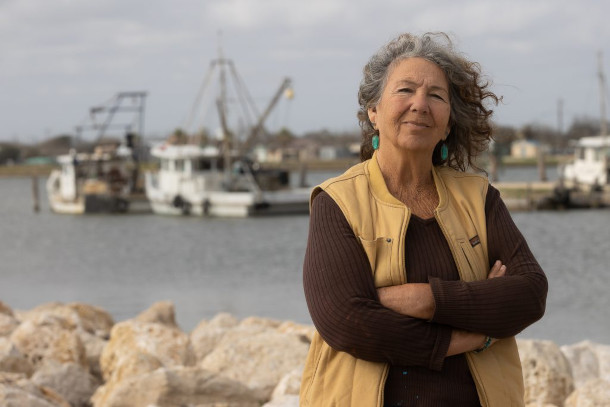
Diane Wilson in Lavaca Bay, Texas (Photo: Goldman Environmental Prize)
The 2023 Goldman Environmental Prize winner from North America went toe-to-toe with one of the largest petrochemical companies in the world, Formosa Plastics, and won a $50 million settlement over its illegal dumping of toxic plastic waste. Diane Wilson joins Host Steve Curwood to share her story of dogged truth-seeking and holding a major polluter accountable for spoiling the biodiverse landscape of the Texas Gulf Coast.
Transcript
CURWOOD: It’s Living on Earth, I’m Steve Curwood.
Diane Wilson is this year’s Goldman Prize winner from North America. Diane is a lifelong shrimper and fourth generation fisherwoman from Calhoun County on the Gulf coast of Texas and in the late 1980s, she started catching far fewer shrimp. At the same time, she learned her county was among the most toxic in the US. So, Diane started to investigate, and ultimately in December of 2019, she won a $50 million settlement from petrochemical giant Formosa Plastics for illegal dumping of toxic plastic waste. Formosa Plastics agreed to reach “zero-discharge” of plastic waste from its Point Comfort factory and pay for remediation of local wetlands and beaches polluted with their plastic waste. Diane Wilson wrote about her decades-long crusade in the book Diary of an Eco-Outlaw: An Unreasonable Woman Breaks the Law for Mother Earth. And she says today that despite all the pollution, the Lavaca Bay area is still home to rich biodiversity.
WILSON: Well the thing of it is there's upper Lavaca Bay and then it kind of flows into Matagorda Bay, which flows into the entire Gulf of Mexico. Bird species is one of the biggest places where people come down all over the country just to do bird watching. We got the endangered whooping crane, where they come to winter every year, we have the ridley turtles and we also are totally surrounded by we have Formosa Plastics, which is 17 units $7 billion worth, we have Alcoa aluminum that started in 1950. And we got the largest underwater Mercury Superfund site and the middle of it. So we've only got like 18,000 people in the whole county, but we've got a large fishing community. They're Vietnamese, they're Hispanic, they're working class fishermen. And these bays are the lifeblood, I mean, the communities are fishermen so it is their identity. And they are being literally destroyed because there's closures. There's signs, big signs all over the bay that says you can't eat fish, you can't eat the crab because of the levels of mercury in it. And then you've got Formosa Plastics that has been dumping plastic for 27 years. And the pellets, the plastic pellets are picking up the mercury and they're being dispersed all over the bays. And it goes down into the Gulf of Mexico and a little bit further on down the beaches toward Corpus Christi because along Padre Island they got all of these pellets washing up on the beaches, and they're like we're in a sand hill or these pellets come in from. And so you know, you can track it from these plastic manufacturers and Formosa makes a trillion pellets a day.
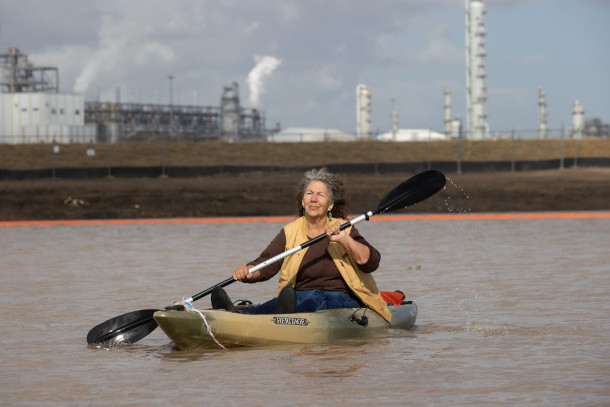
Diane Wilson kayaking with the Formosa Plastics compound in the background. (Photo: Goldman Environmental Prize)
CURWOOD: That's a lot of pellets.
WILSON: It's a lot of pellets, a lot of pellets, and they've been known for 27 years.
CURWOOD: So what tipped you off to Formosa's connection to the pollution there in Lavaca Creek?
WILSON: Well, when I first started in 89, I absolutely knew nothing. I didn't know where Formosa was. I didn't know who they were, I didn't know the Taiwan connection. But when I asked for a meeting and started to get this tremendous backlash, you know, like I had state senator aides, I had bank presidents, I had economic development, and they were all coming down just trying to get me to shut up and not ask questions. And that's when eventually I had a reporter from Houston come down and he was amazed that nobody, anybody in Texas, with Congressman Phil Brown, down to the senators, down to the economic development, down to Chamber of Commerce, never asked a single question about Formosa's environmental record in Taiwan. And I mean, they were literally being kicked out of Taiwan. I mean, the people in there was so mad, they were throwing rocks at him up to Chairman Wong and he you know, he was getting his feelings hurt, so he was going to come down to Texas to Louisiana where they appreciated him. And so I started finding out their environmental record in Taiwan. And then I started having workers from the plant. I guess you could say, my key allies in this fight have been workers from the plant, because when a worker gets exposed when he has had enough, he's seen stuff, that's not right. He can't go to the plant because they will fire you. It's not organized, there's no protection. You go to local officials, they will tell you, well, we got a contract, the mayor's getting computer systems from them. You can't go to the state environmental agency, you can't go to the federal EPA, you can't go to OSHA, which is supposed to give them protection. So eventually, I'm at the bottom of the list, but eventually they come to me and that's when I really found out what Formosa was doing.
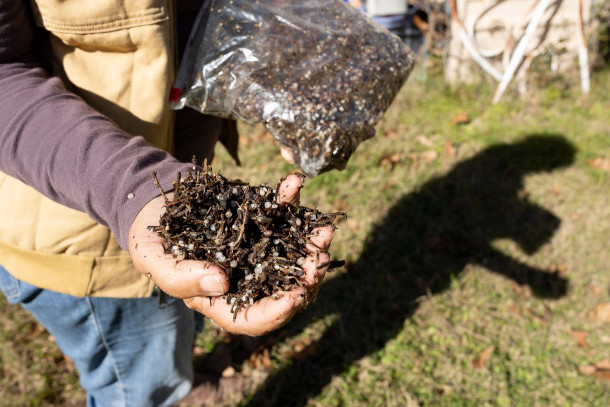
Pollution from plastic “nurdles”, small pellets manufactured by Formosa Plastics’ Point Comfort, Texas compound. (Photo: Goldman Environmental Prize)
CURWOOD: Wait wait You're saying they came to you. What do you mean they came to you?
WILSON: I had Formosa workers that came to me and over the years, I've been doing this 34 years, I've probably talked to 100 workers. They were either exposed, they were sick, they were saw something that really outraged them and they had had enough. And you know, and some of it's been, like shift supervisors been there 25 years, it's been in wastewater, I have had upper management come to me, that's how bad it gets sometimes it's when you get started getting upper management that will come to you and tell you stuff. And I get documents, I get all kinds of memos and that's how you find out what's really going on in a plant. Because you ask industry and there's no work loss, there was no injury, anything that happened was worker error. That's a big one worker error. You know, and if there has been a spill, you don't hear it from industry, you hear from the workers. And I would get calls at midnight, I would get calls, wanting to meet in parking lots and wanting to meet and alleys. And you know, one time I was down in Corpus Christi, and I was at the state environmental agency, and I was kind of going through the boxes of information on Formosa. And I had these investigators that every once in a while they'd come in the door and look at me. And then finally one of them kind of said, come here, come here. And he took me to the filing cabinet, pulled out a file and said you do something with it. He said, it's real strange. I just goes to this bottleneck, and nothing happens. He said you do something with it. And you know, it was all the groundwater contamination under Formosa, which is extensive, but nothing happened. You know, and so I took all that information, took it to the county commissioners, took it to the county judge. And I mean, those commissioners were literally trying to run from me, they didn't want that information. So I've become quite good at being a private detective actually.
CURWOOD: Now, so nobody is going to help the county doesn't want to help, the state doesn't want to help, the EPA doesn't want to help. So how did you get action?
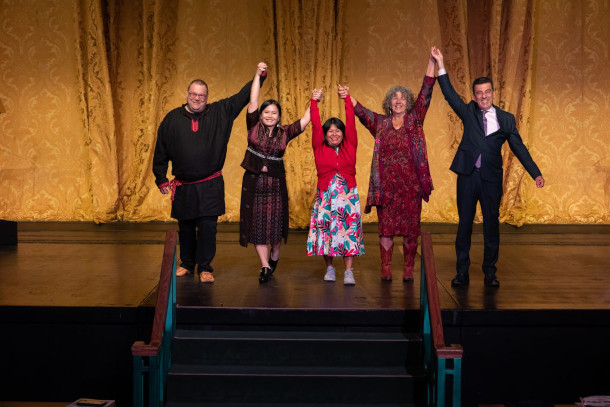
The Goldman Environmental Prize is awarded to six grassroots environmental heroes each year. Pictured here at the 2023 Prize Ceremony from left are recipients Tero Mustonen, Delima Silalahi, Alessandra Korap Munduruku, Diane Wilson, and Zafer Kizilkaya. The 2023 Recipient for Africa, Chilekwa Mumba, attended the ceremony virtually and is not pictured. (Photo: Goldman Environmental Prize)
WILSON: Mainly, believe it or not, and it wasn’t because I had an experience or had any political savvy, I started doing civil disobedience. I remember the first time you know like Formosa, it was the largest thing in Texas, ever. And they had all of these federal projects, they were going to give them all this text abatement, you know, all of this. And they were not going to have to do what they call an environmental impact study, like, how is this plant going to impact this community and this body of water Lavaca Bay? It was going to have to do it, you know and Formosa was like, we don't have to do it and the EPA was saying, we don't have to do it. And I was like, well, you know, and I had this activist out of Houston and he said, Diane, he said, the parades over, you're at the end, so just pat yourself on the back and say you did a good job, but it's over. You can't do anything. And I said, they're not going to get that body of water. And he said, You can't do nothing about it. And I said this off the top of my head. I said, I'll do a hunger strike. [LAUGH] And he got the biggest kick out of that laughing He said they don't do hunger strikes in Texas. They might in California, but they sure don't do them in Texas. And I said, I don't care. I'm doing a hunger strike. And I know enough about human nature and myself that if I did not do that hunger strike, right then. I mean, I'd go to sleep that night, wake up in the morning and say, boy, that's the stupidest thing you ever thought of. And so I immediately got ahold of a reporter and said, I'm starting a hunger strike. And she said when and I said right now. And so I started a hunger strike, it was the first one and I didn't know how to do it. I didn't have a cell phone, I did it on a shrimp boat and the only one who really knew I was on a hunger strike was Formosa. And every day this, he was regulatory affairs at Formosa. He brought down all these engineers and suits and did get bring him down there and they'd look at me and then he'd say now, isn't she a stupid woman? And then he'd say, oh, Diane, please get off this hunger strike, get off the hunger strike. And I stayed on the hunger strike. And believe it or not, two weeks on a hunger strike, with very little support, almost no media and I won it! The EPA made Formosa do an environmental impact study.
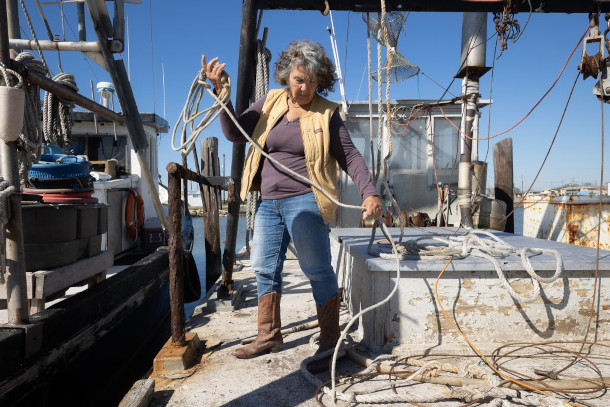
Diane Wilson untangling rope on a shrimp boat at Seadrift Harbor. (Photo: Goldman Environmental Prize)
CURWOOD: Ahh.
WILSON: So it turned the whole thing around and it stalled everything. All of the federal agencies got involved, the public got involved. And so, you know, it didn't stop them but it definitely stalled them enough that people could get involved. And so that was a good thing. And that's when I realize how powerful and changing things that civil disobedience could be. So predominantly, that's how I did stuff down there is through civil disobedience.
CURWOOD: I gather ultimately, the environmental impact statement that the EPA put together was not enough to stop Formosa.
WILSON: Oh, goodness, no goodness, no.
CURWOOD: So what did you have to do to stop Formosa?
WILSON: Well, the thing is, Formosa is still, you know, they've got permits are still discharging. I did a lawsuit with the help of a legal aid group and they did environmental work and so I hired them. And me and a couple of the workers from the plant we collected all this evidence that Formosa was discharging all of this plastic and powder, and they never admitted to it. They flat told to my face, they had never discharged a single pellet. I mean, I mean bald faced lie. So we collected all the information. We documented it. We did probably 2,500 samples. It took two and a half years of documentation. I took 8000 photos and videos, and we went to court and we won.
CURWOOD: Let me ask you, when you were documenting their pollution, how did you gather evidence of their illegal release of of these plastic bits, these nurdles?
WILSON: You had no knowledge of it, so you had to just go looking for it and we knew it was out there. So I had to kayak, I kayaked all over that place. I finally found every single stormwater outfall and some of these outfalls are big enough that you can land a helicopter in them. And to get a sense of the volume of them, is that in discovery, I found one of Formosa's releases out of one of the stormwater outfalls which is not supposed to have anything but water in it and they had released 167,000 pounds of pellets in one day at one outfall, and for most has been doing this for 27 years.
CURWOOD: What's going on here, how is it that a plant can be discharging this much plastic?
WILSON: Well the thing that is I think most people have no idea what these plastic plants are really releasing it's like Formosa's got 16 units and you have packaging, you have them putting on trains, you them have putting on trucks, and almost at every point in that process they're losing thousands of pounds of plastic. And then you have the powder. I mean the PVC powder, the polypropylene, the polyethylene, and I know I had a worker that was on the SPDC Specialized PVC Powder and it was a five story building and he sent me photos from inside and it looked like a blizzard and powder went all the way up to the fifth story it was open, it was in the fields. It's it's everywhere, it was everywhere, they lose it everywhere.
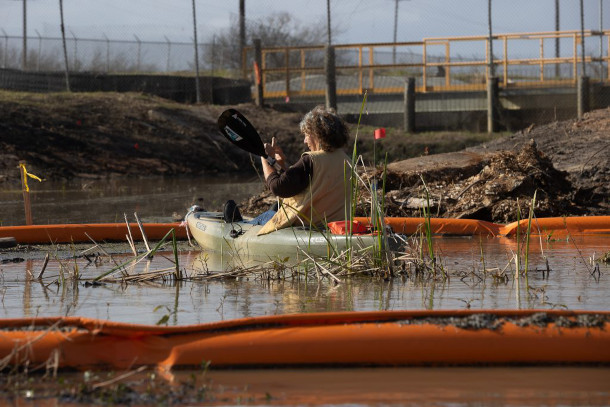
Diane Wilson kayaking among the Formosa Plastics remediation site. (Photo: Goldman Environmental Prize)
CURWOOD: How are the cancer rates?
WILSON: Oh my god, there was so much concern about the workers in the vinyl units, which is around the plastic of brain cancer. They were even scared to go to the doctors because they thought they had brain cancer. It was so much of a concern that even the management got wind of it. And so they sent out a memo and they're like to all the vinyl chloride workers who are concerned about brain cancer from the vinyl chloride exposure and they were sending down a doctor. And so they presented the vinyl workers with a study that was by the American Chemical Council and the Vinyl Institute and it said there is no harm in vinyl chloride exposure to brain cancer and you guys, just do not worry about it. But it's rampant cancer is like all of these guys have got, you know, all the ones that I work with, all of them are sick and got neurological damage to their legs and their arms and it's a very sad state of affairs. That's a big problem on the vinyl chloride exposure and EDC and the benzene and all of that, it's rampant.
CURWOOD: Formosa Plastics has been trying to put up a plant in Louisiana.
WILSON: Oh, that's true. That's true.
CURWOOD: Local folks have been pushing back against that and Formosa right now is on the negative side of various rulings. Any advice to the communities that are fighting Formosa there?
WILSON: Yeah, I would tell them the one thing you know, I've been doing this 34 years and the one thing I regret was that I did not try harder to stop them completely. They have no idea how it would change their community, like the community of Point Comfort for Formosa is that it started out like 1400 people, a school all of this, now it's down to 600 people, because the majority of the people left and wanted to get away. The school closed down, and now it's Formosa's training center. So it is like Formosa from one end to another, the landowners next to them that have been there, the ranchers that had been there for 160 years, Formosa bought every single one of them out. Just you know, they just acquired 2500 Acres. It's like a steamroller and it will roll them down and destroy the community.
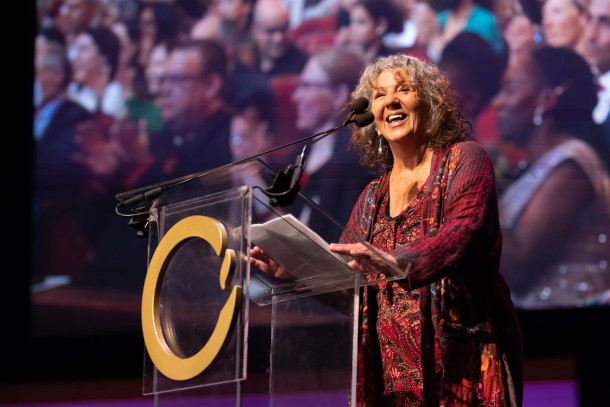
Diane Wilson speaking at the 2023 Goldman Environmental Prize ceremony. (Photo: Goldman Environmental Prize)
CURWOOD: So what keeps you going? I mean, you're dealing with a multibillion-dollar corporation that, you know, they have phalanxes of lawyers. They have apparently, as you say, you suggest everyone from the local county politicians right on up through federal elected representatives support them, what keeps you going?
WILSON: I'm a fourth-generation fisherwoman, my family's been here around 130 years, I've been on a boat, the back deck of a boat since I was eight years old and I would say I have bonded with that bay. When I was really little and I would go down the bay to see my dad come in and bring in the shrimp and all the boats and all of that it's like I literally could see this old woman down there and she was always glad to see me and this personality that she had. And you know, and and I remember maybe a few years later when I realized is ,that old woman was water. I literally could see her, so the water to me is real, it's alive, it has value, it's family, and it's like I will not let them get that bay. I will not do it. I can't I can't it's it's probably the best part of myself.
CURWOOD: Wow I want to thank you Diane Wilson, winner of the North American Goldman prize of 2023.
WILSON: Thank you very much. I appreciate it very much.
Links
Listen to our previous 2023 Goldman Environmental Prize interview
Living on Earth wants to hear from you!
Living on Earth
62 Calef Highway, Suite 212
Lee, NH 03861
Telephone: 617-287-4121
E-mail: comments@loe.org
Newsletter [Click here]
Donate to Living on Earth!
Living on Earth is an independent media program and relies entirely on contributions from listeners and institutions supporting public service. Please donate now to preserve an independent environmental voice.
NewsletterLiving on Earth offers a weekly delivery of the show's rundown to your mailbox. Sign up for our newsletter today!
 Sailors For The Sea: Be the change you want to sea.
Sailors For The Sea: Be the change you want to sea.
 The Grantham Foundation for the Protection of the Environment: Committed to protecting and improving the health of the global environment.
The Grantham Foundation for the Protection of the Environment: Committed to protecting and improving the health of the global environment.
 Contribute to Living on Earth and receive, as our gift to you, an archival print of one of Mark Seth Lender's extraordinary wildlife photographs. Follow the link to see Mark's current collection of photographs.
Contribute to Living on Earth and receive, as our gift to you, an archival print of one of Mark Seth Lender's extraordinary wildlife photographs. Follow the link to see Mark's current collection of photographs.
 Buy a signed copy of Mark Seth Lender's book Smeagull the Seagull & support Living on Earth
Buy a signed copy of Mark Seth Lender's book Smeagull the Seagull & support Living on Earth

